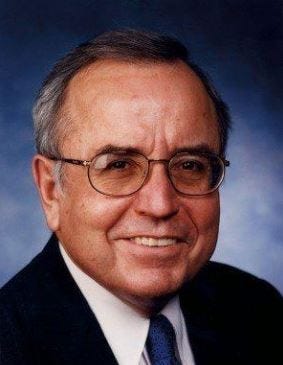
The wide-margin victory of Lori Lightfoot in the runoff election for Chicago mayor is no surprise, and neither is the reaction of many news outlets. In contemporary politics and society, the gender, race and personal life of Mayor-elect Lightfoot get major emphasis.
Meanwhile, there will be no escape from Chicago’s grim fiscal challenges. This is not alarmist rhetoric, but harsh reality.
Chicago historically was respected, indeed by many admired, as “The City that Works,” in several meanings of that word. Illinois poet and Abraham Lincoln biographer Carl Sandburg described the metropolis as the “City of the Big Shoulders,” a reference to the enormous industrial manufacturing base that created jobs and contributed significantly to long-term prosperity for the Midwest and America overall.
Politically, Chicago’s durable political machine provided a reliable base of Democratic Party strength. Jobs were available for immigrant groups, especially but not exclusively the Irish, when widespread prejudice excluded them from the prosperous corridors of established society.
In the past, the Republican Party was also powerful, in the suburbs surrounding city precincts, and throughout most of the rest of the state. This gave Illinois status as a swing state in national elections. Both political parties as well as a range of other organizations held conventions in Chicago.
For two decades following World War II, Mayor Richard J. Daley of Chicago orchestrated and reinforced the strength of his city. This year, the mayoral primary election confirmed the era of Daley family political dominance has passed, at least for now. His son Bill Daley’s defeat in the primary is noteworthy.
Voters want change, which gave Lightfoot a crucial advantage. Cook County Board President Toni Preckwinkle, her general election opponent, represents Chicago machine politics, today a burden. Federal investigation of City Councilman Ed Burke, an ally, is a related wound.
Outgoing Mayor Rahm Emanuel grapples ferociously with massive financial shortfalls. Government overspending is the legacy of his predecessor Richard M. Daley.
In striking contrast to this Daley, the father was a brilliant manager. Richard J. Daley ruled city government, and the Democratic Party, from 1955 until 1976.
Daley Senior in leading Chicago combined an iron fist with a skillful hand. Earlier, he was Director of the Illinois Department of Finance and Clerk of Cook County. In both posts, he developed great skill in financial management, masked by his famous eccentric speaking style. Annual city budget reviews were legendary ordeals in discipline.
This Daley also had great party power. Unlike his son, he was also chairman of the Cook County Democratic Party. Chicago then loomed larger compared with the suburbs, and political practices were less scrutinized. Current party chairwoman Preckwinkle lacks this advantage, and Daley’s unusual skills.
In 1976, Jimmy Carter carried Chicago by a wider margin than John F. Kennedy did in 1960. In consequence, Mayor Daley called Carter to announce the election was in the bag. In fact, Carter lost Illinois but won the election, the first time the state had gone against a presidential winner since 1916. Daley died suddenly in December that year.
The real test of Chicago’s new mayor will be old-fashioned management, not gender, race and lifestyle symbolism. Mayor-elect Lightfoot has impressive related professional experience. She has been a senior partner at respected and influential law firm Mayor Brown LLP. An ally at the firm is Republican leader Tyrone Fahner, former Illinois Attorney General.
Metropolitan Chicago remains a global commercial center. Mayor Emanuel’s elections demonstrate decline of another historic prejudice: Anti-Semitism.
Arthur I. Cyr is a Clausen Distinguished Professor at Carthage College and author of "After the Cold War."
This article originally appeared on Crestview News Bulletin: New Chicago mayor faces same old financial crisis
